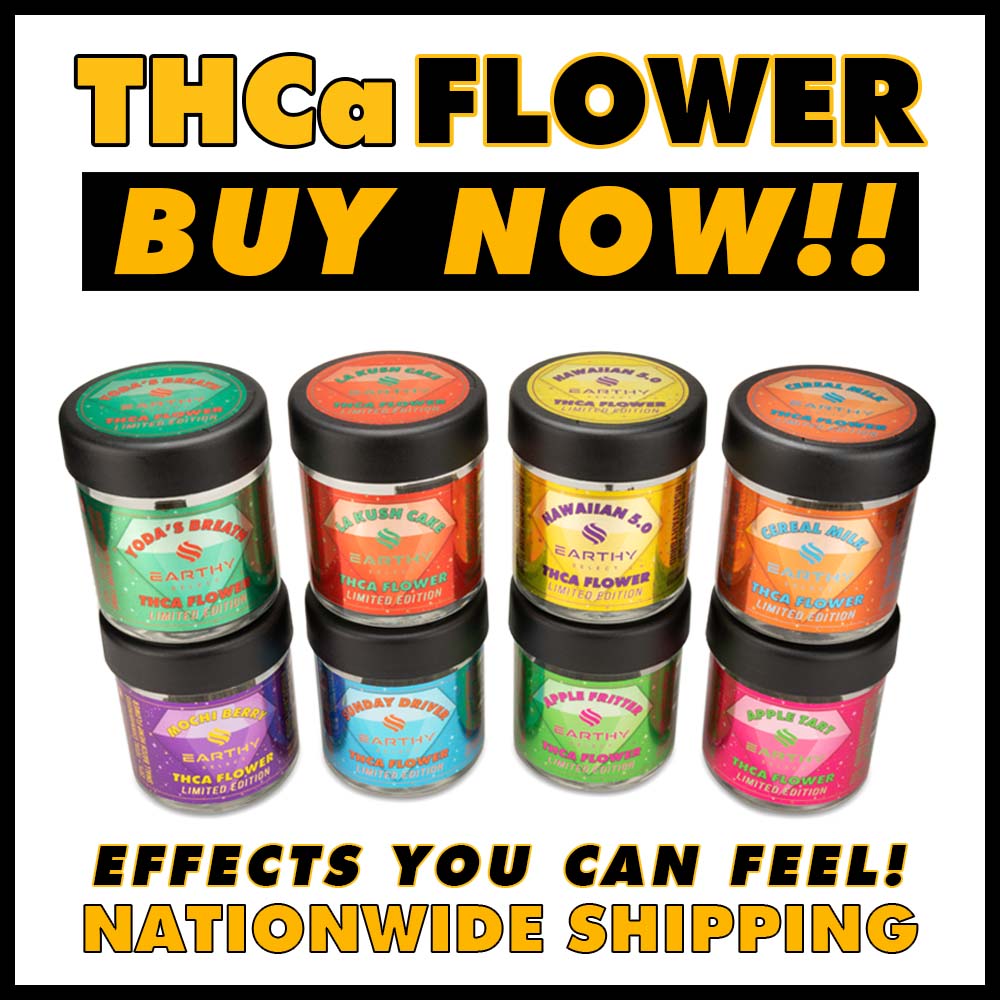Does THCa Get You High? It’s Complicated
What’s all the buzz about THCa? Some say it’s non-psychoactive. Others say it can get you high if you know the secrets. So, what’s the truth? Does THCa get you high? Through the confusing haze of cannabinoid information, THCa has recently come into clearer focus because, well, there’s a lot to love about it.
Here, we’ll help you better understand the cannabinoid that seems to have something to offer to everyone. Whether you’re seeking a euphoric high or just an extra-healthy smoothie, THCa might be the cannabinoid to get you what you want.
What is THCa?
Tetrahydrocannabinolic acid (THCa). In other words, the chemical structure of THCa is one that has not yet turned into its psychoactive counterpart. One of the hundreds of cannabinoids in the cannabis plant, THCa is abundant in freshly harvested cannabis flowers and raw cannabis leaves [1].
But something interesting happens to THCa when it is heated. Abracadabra, the flower becomes something that could get you very high indeed, if you’re not careful. So, the big question for many becomes: does a high-THCa cannabis strain indicate that its host is a hemp or marijuana plant? This is where things get a little murky. Here’s the bottom line. What defines hemp and marijuana, according to the Farm Bills, is the amount of Delta-9 THC that cannabis contains, not the total THC content, so THCa isn’t factored in when it comes to federally compliant hemp.
At the end of the day, the law considers cannabis products federally compliant as long as they do not contain more than 0.3 percent Delta-9 THC per dry weight. Thus, hemp is evaluated only on its Delta-9 THC levels [2].
Delta-9 THC and THCa have similar chemical structures yet behave differently in the body. For example, THCa is a cannabinoid stemming from CBGA, the “mother of all cannabinoids,” which forms as the plant matures. Yet, because THCa has an extra molecular carboxyl ring compared to THC, the cannabinoid can’t bind to cannabinoid receptors to produce the same psychoactive effects as the THC high. But the chemical reaction that occurs when adding heat to raw cannabis changes the molecular structure of THCa to that of Delta-9 THC [1].
Read more in What is the Future of THC?
Is THCa legal?
THCa is federally compliant as long as it comes from a plant with less than 0.3 percent Delta-9 THC before harvest. Nonetheless, the THCa content of a federally compliant hemp product— like THCa hemp flower— may convert to the higher THC levels of its marijuana counterpart if it’s heated. In short, THCa only becomes potentially as psychoactive as marijuana when it is smoked, vaped, or cooked (versus eating using raw cannabis products).
Even though THCa is federally compliant, it’s important to be careful if you want to buy, sell, or use high-THCa products because it may be possible that law enforcement officials and/or legal representatives misinterpret the law and think THCa products with less than 0.3 percent Delta-9 are marijuana products.
What’s important to keep in mind is that THCa converts to Delta-9 THC when heated, yet retains the same legal status of its raw, unheated form if it’s evaluated for the hemp market pre-harvest. On the other hand, the same plant could be evaluated differently in the regulated marijuana markets and determined to be a marijuana plant because of its “total THC” content.
These subtleties in the differences between how hemp and marijuana plants are evaluated could lead to scenarios where the same plant is labeled as both hemp and marijuana depending on who’s measuring it and when it is measured [3].
The Farm Bills and the legality of the cannabis plant
After the 2014 Farm Bill removed hemp from the Drug Enforcement Agency’s list of Schedule 1 substances, cannabis entered a veritable renaissance of commercialization. The Bill designated cannabis with 0.3 percent or less Delta-9 THC as federally compliant and allowed long-forbidden research to commence.
Expanding on hemp’s new legal status, the 2018 Farm Bill allowed the production, sale, and consumption of hemp-derived products. Legal experts maintained that all plant materials and substances derived from legally-defined hemp were federally compliant [2]. Hemp flower with high levels of THCa falls under this category.
Federal law currently defines cannabis plants with less than 0.3 percent concentration of Delta-9 THC per dry weight as hemp plants and allows hemp production and consumption in all 50 states. On the other hand, a cannabis plant with more than 0.3 percent Delta-9 THC per dry weight is defined as marijuana, which the law still treats as a controlled substance on the DEA’s Schedule 1 list.
Many states allow medical use and/or adult recreational use of cannabis containing much more than 0.3 percent Delta-9 THC.
Does THCa get you high like Delta-9 THC?
Strictly speaking, THCa does not get you high. It is a non-psychoactive cannabinoid, so if raw cannabis plants are consumed unheated, and soon after harvest, they will remain in their non-psychoactive form as your body processes them. However, heating the plant via smoking, vaping, or cooking, will convert THCa to its psychoactive form.
THCa flower has many commercial applications, including raw cannabis tinctures, powders, or “diamonds.” Any of these types of products will not yield non-psychoactive effects unless they are heated. Therefore, if you eat THCa edibles, you will not feel high like from Delta-9 THC edibles. However, if you smoke THCa in its raw form or heat products derived from THCa flower, you will feel the same intoxicating effects as with Delta-9 THC.
How THCa converts to THC: the decarboxylation process
The conversion process of THCa into THC happens in a chemical change that occurs when the cannabinoid encounters a heat source. When this occurs, it is called the decarboxylation process.
Though decarboxylation occurs through heat, it also can happen when the plant is exposed to light or as it naturally dries. The high temperatures achieved with smoking and vaporizing THCa will instantly decarboxylate the cannabinoid, making it immediately available as a psychoactive substance for your body to absorb. On the other hand, it will take time for cannabis to decarboxylate in the drying process.
Even exposure to oxygen can contribute to the decarboxylation process, so if you’re hoping to slow down the process, you should keep your high-THCa cannabis or cannabis products in air-tight containers to maintain their potency and freshness [4].
Learn more: THCa Flower and Decarboxylation: Transform Your Hemp
What are the benefits of THCa?
Though research about the benefits of THCa is scarce, anecdotal reports and some initial studies indicate that it might offer potentially promising health-related effects, though more research is needed. When consuming raw cannabis for its THCa content—through juicing, for example, or taking a THCA-based tincture or edibles made with THCa isolate—some people report that it provides some of the same benefits as active THC, yet without the intoxication. For example, there may be potential for THCa to help relieve nausea. In a recent rat study, THCa was shown to reduce nausea and vomiting [5]. Is it possible that it could help humans too? Time will tell.
Though there isn’t enough evidence to indicate THCa provides users with the same level of pain relief as some people get from Delta-9 THC, THCa still interacts with our endocannabinoid receptors, yet in a different way. Some initial studies have illuminated THCa’s potential to provide neuroprotective qualities to users, which gives researchers hope that, with further research, it may potentially useful as an approach to slowing and/or preventing neurodegenerative diseases like Huntington’s disease [6].
Want to try THCa for yourself? Check out Earthy Select’s awesome selection of pure and potent THCa Flower and Concentrates! Our high THCa strains are sustainably grown and harvested using organic practices on family farms and indoor facilities in California and Colorado. Our plants are handled and processed with care to produce rich terpene profiles and excellent flavors and effects in each strain. For full traceability from farm to shelf, our cannabis is lab tested according to USDA standards, both pre and post harvest.
Buy THCa Flower In Georgia – Buying Guide For Best THCa
Will THCa make me fail a drug test?
Contrary to what many people think, most drug tests don’t actually test for the THC in cannabis. Rather, they test for a metabolite THC creates within the human body called THC-COOH. THCa also creates THC-COOH in the body. One of the reasons most tests screen for THC-COOH instead of THC is that the metabolite stays in your body longer than THC. However, most drug tests, including those used by federal workplaces, usually have ways of preventing trace amounts of THC-COOH from causing a positive drug test result [7].
Nonetheless, if you are concerned about THCa potentially causing a positive drug test result, you may want to avoid taking any THC product for a period of time before the test or consult with your doctor to make sure you get your facts straight.
Navigating the Legal Landscape of THCa: Which States Allow THCa Concentrates?
Does THCa get you high? The bottom line
Although you can’t get high from pure THCa, the acidic compound still may offer positive benefits that impact your experience. Perhaps best known for its ability to transform into something that can get you high when heated, THCa has become a convenient vehicle for tapping into your endocannabinoid system’s CB1 receptors without having to procure a controlled substance. In other words, THCa isn’t psychoactive, but it allows for the creation of THC, which, for many, is one of cannabis’ main attractions. If you’re ready for premium and federally compliant THCa, buy THCa flower directly from Earthy Select!
The Ultimate Guide to THCa Flower
Medical Disclaimer / Legal Disclaimer – Information is provided for educational purposes. It does not and is not intended to constitute legal advice or medical advice. We attempt to be accurate and up-to-date, but the legality of cannabinoids and the science of cannabis are evolving. The author is neither a legal professional nor a medical expert. Before buying or using any products, you should check with your local authorities and medical providers.
References
-
- Tetrahydrocannabinolic acid
- HIA Position Statement on Delta-8 and Hemp Cannabinoids
- THCa Flower – The Next Big Thing in Hempland?.
- Decarboxylation guide: How to properly decarb weed
- Tetrahydrocannabinolic acid reduces nausea-induced conditioned gaping in rats and vomiting in Suncus murinus
- What is THCA and what are the benefits of this cannabinoid?
- THC vs THCa: What is Tetrahydrocannabinolic Acid?
- How to Decarboxylate Cannabis to Use in Oils, Edibles & Salves
Frequently Asked Questions
Does THCa decarboxylate when exposed to UV light?
THCa will begin to decarboxylate when exposed to UV light, but at a slower rate than with smoking, vaping, or cooking.
What temperature should you cook THCa to decarboxylate it?
Experts say to cook THCa at approximately 230-250°F to decarboxylate cannabis. In this range, THCa converts to THC while preserving many other cannabinoids and terpenes [8].
What does THCa do?
THCa flower can produce a pleasant and psychoactive experience. Although everyone is different, it is possible to feel intoxicated or high after using THCa Hemp Flower. Many cannabis consumers and patients use THCa by smoking, vaping, or cooking with THCa hemp flower. When used this way, THCa flower can produce pleasant feelings, euphoria, psychoactive experience, excitement, creativity, deep thinking, relaxation, closeness and more.
How long does a THCa flower high last?
The effects of THCa flower vary from person to person. Things like age, metabolism, and tolerance all play an essential role in how much you will feel. However, generally speaking, the results of using high THCa hemp flower can last between two and six hours.




